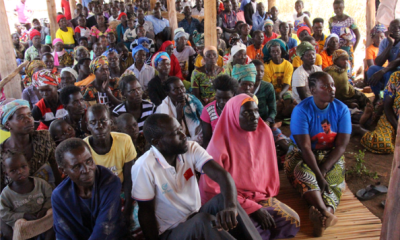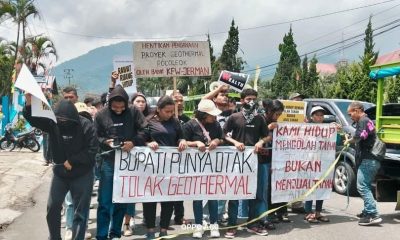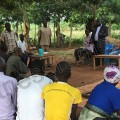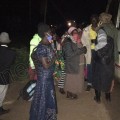By witnessradio.org Team
Masindi – Uganda – In an effort to hold investors and their agents accountable and curb COVID-19 lockdown violence and human rights abuse, communities in Kiryandongo district have ran to Masindi High Court and sued Agilis Ranch 20 and 21 limited and Saracen, a private security firm hired to guard the company. Agilis Ranch 20 and 21 is a subsidiary of Agilis Partners, which also owns many other food dealer companies including Joseph Initiatives and Asili Farms.
Agilis Partners through its companies is financially supported by DOB Equity (dob Foundation) of the Netherlands, via the UK-based Dutck Oak Tree Foundation, owned by the De Rijcke family of the Netherlands; the United Nation’s Common Fund for Commodities, via the Dutch Trust Fund arrangement set up by the Netherlands Ministry for Development Cooperation; and the UK’s Department for International Development (DFID) via its Food Trade programme among other Development Finance Institutions.
Since lockdown measures were announced in Uganda on March 18th, 2020, multinational companies that are grabbing community land with the help of district security apparatus, have intensified violence ranging from house demolition, illegal arrest and detention, torture, attempted defilement, water sources have been filled with soil to plowing food crops (cassava, maize, sweet potatoes, and banana e.t.c) covering hundreds and hundreds of acres of land without a court action.
Byaruhanga John, one of the land owners who was tortured with intention to force him off his land by Agilis Ranch 20 and 21 limited workers and security guards from Saracen security firm, said state institutions in Kiryandongo district have abandoned them while siding with their tormentor-investors.
He added that the compromised area police has made it difficult for affected locals in Kiryandongo district, to report and open up a case against companies or their workers during the current COVID-19 lockdown. “all police officers have informed us that they have instructions from Kiryandongo district police head one Bakaleke Joseph not to attend to our concerns, instead they refer us to his office” said Byaruhanda.
He further explained that when he went and met Bakaleke Joseph in his office, Bakaleke offered to mediate between him and his tormentors to get treatment, which he refused.
Byaruhanga narrates that on the 22nd day of March 2020, at around midnight, he heard a knocking noise reverberating from the door to his house. He said that followed with voices of some unknown people who were demanding him to open the door. He added that they threatened to break in or burn down the house if he did not open for them, which he begrudgingly complied with their demands. He revealed that they were armed with clubs, pangas and the other was armed with a gun.
He further narrates that when he opened the door and stepped out they ordered him to sit down, which he complied. He added that a group of men grabbed him, got beaten and kicked, which. lasted about 30 minutes. He said, it reached a point where by he could not endure any further beatings from his captors prompting him to make an alarm. He explained that his wife, who watched my beating in disbelief, could not contain it anymore and therefore joined him in wailing and making an alarm in anticipation of being rescued from my captors.
“The wailing and alarms from both my wife and I forced my captors to bundle me into the trunk of an awaiting Tata lorry truck, and drove off to the Agilis Ranch 20 and 21 Limited camp which is about 30 miles from my home. To the best of my recollection, Odongo and Ondema, employees working with the company, were part of the six members who beat me” narrates Byaruhanga.
Byaruhanga who’s among the many victims of torture and violence orchestrated by Agilis Ranch 20 and 21 Limited especially during the ongoing COVID-19 lockdown said, the attack left him stressed, psychological tortured, helpless and hapless and stripped of his dignity, with other effects spread to his children who are traumatized after learning of his ordeal during his arrest, and detention by company workers.
He said, he wants court to order companies to compensate him and other victims for torture suffered and properties destroyed as well as direct re-instatement back on their land.


 MEDIA FOR CHANGE NETWORK1 week ago
MEDIA FOR CHANGE NETWORK1 week ago
 MEDIA FOR CHANGE NETWORK2 weeks ago
MEDIA FOR CHANGE NETWORK2 weeks ago
 MEDIA FOR CHANGE NETWORK1 week ago
MEDIA FOR CHANGE NETWORK1 week ago
 MEDIA FOR CHANGE NETWORK1 week ago
MEDIA FOR CHANGE NETWORK1 week ago
 MEDIA FOR CHANGE NETWORK2 weeks ago
MEDIA FOR CHANGE NETWORK2 weeks ago
 MEDIA FOR CHANGE NETWORK13 hours ago
MEDIA FOR CHANGE NETWORK13 hours ago



































